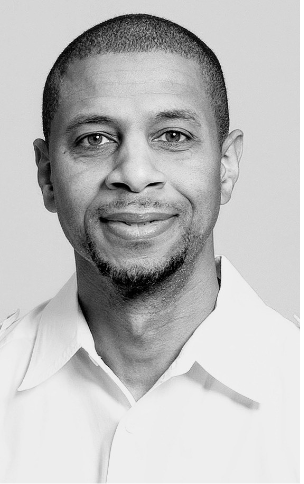Meet David
Interviewed by Johns Hopkins University students supervised by Dr. Homayra Ziad.
Interviewers: Maryam, Maddie, Aya, Ananda
About the Interview
In this interview, David Mohamed recounts his life experiences from a young boy in the Muslim community in Chicago until his wrongful imprisonment in relation to September 11th. Early on, Mohammad establishes the idea of community: How being raised in a black Muslim Community under the leadership of Imam Warithuddeen David allowed him to become intimately aware of community in the development and betterment of self. As a young man, he moved to a much smaller city in the South and was able to experience being a Muslim in a place where being a Black Muslim was a very uncommon thing. At this point, he was able to feel the reality of classism and community as a tool that shapes people’s experiences and futures. In college, Mohammad studied in Atlanta where he again became part of a vibrant Muslim community.
Through public da’wah with his father, as well as occasional run-ins with the police, David realised the power of his word and the importance of shaping one’s narrative. David was arrested at a traffic stop sometime before September 11th and arrested again while going to his rescheduled court date (which was originally supposed to be on September 11th). To the police officer, Mohammad’s Quaranic book and 9/11 ticket were sufficient to label him a potential terrorist, and though it was determined he had no connection to the event, through the judicial system he remained within jail for several months. While in jail he learned about the broader historical and cultural context behind the War on Terror and the attack on the Twin towers. While in jail, Mohammad was able to use his skill of public speaking to do a more natural da’wah, and once he was released, he used his experiences to provide help to local nonprofits and local agencies. Through the years Mohammad has learned that the path forward is by cutting through the noise and getting to the heart of the matter: The War on Terror is simply a small context of a larger discussion concerning capitalism, colonisation, classism, race, and gender.
Guiding Questions
David Mohamed believes that Muslims must shoulder the responsibility of educating others, not just about their faith, but a history that has to lead to the War on Terror. On the other hand, there is much current discussion concerning whether or not it is a burden (or even retraumatizing) for Muslims to address Islamophobia. Are there ways to reconcile these two beliefs? Which do you believe has more credence?
Often poor, and frequently Black, Muslim communities are not properly represented both politically and socially. David recommends stepping outside of one’s community for outside perspectives, is this effective along race and, in particular, class lines? What are the ways that the marginalised voices within the Muslim community can be properly represented?
“You know, they weren’t in power anymore, so now you gotta adjust. So, then what? You’re not free anymore, they own you because they got there first, and now, yea, okay you can pray, but you don’t own anything. You’re praying on their land, you’re praying in their store, your, your, all of your, everything about your life, outside of your rituals, is owned by them. And pretty soon, as we know in some countries, they’ll, they’ll say, based on their nationalistic policies, ‘You don’t really need those rituals , the nation gives you’. So that’s where we are.”
“Because many of our communities are struggling, have been struggling, economically, and have lack of resources and whatnot. So, doing a lot with a little. And he said for so long we had put most of our tension into one leader, then that leader dies and then, you know, it impacts the community in a way that is just, there’s no succession, you know, it’s like, community starts to, to flail, you know, and splinter. And he said the other reason was, most of our movements, our best movements have been protest movements. Very reactionary. ”
“I think, I guess the way I heard it in a quote, says that “Each person you meet is a door to a world that you otherwise could never have had access to.” And we are a- If you talking Islam, that is a world of over a billion worlds and, and, all of that is- you know, we are all sort of the fruit of the universe. So, you know, whatever it is that happens in the space of this life, we have to get to where we really look for what is authentic, we can kind of just get on that, back to that I might say, the basic human values, we can find that in the space of whatever the thing is, at least we have a starting point…
Doesn’t mean we got it all figured out, everybody’s gonna like each other, but at least, at least we see each other as human beings, you know. Like, like some of these conversations is like, you know, it gets real scary when, when you start, you can hear it in the language, they start talking about people like they’re things. And it gets real uncomfortable, real fast, you know. So that would be it. That would be the thing, we’re each a door to something bigger, you know. Let’s get there before we have our natural life lock on lockdown, you know, you don’t have to go to jail to get this.”

